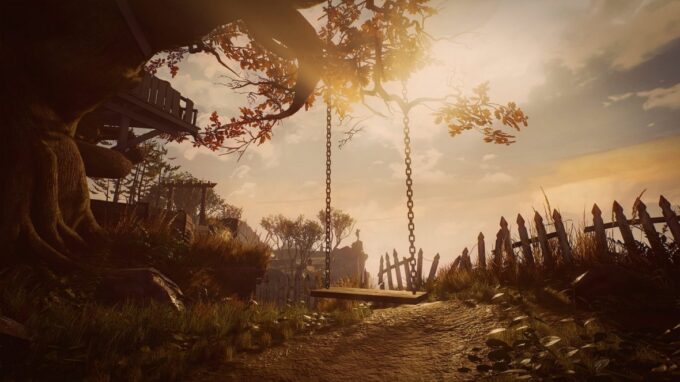Edith Finch has arrived at her family home hoping to find a use for a key left in her possession. It’s a mysterious home, towering over the trees around it with rooms stacked on rooms, precariously reaching toward the stars. It’s a house steeped in reminders of the people who used to live there, and the tragedy that beset them.
Each room is a monument to the person who once called it theirs, left untouched following their untimely or ambiguous fate. It’s through these rooms that Edith, and the player, learns about the Finch family’s tragic history.
Giant Sparrow’s follow-up to The Unfinished Swan is about this family and the apparent curse that’s been stalking them.
When young Edith arrives she finds the house as she remembers it: messy, with books stacked up, clutter strewn everywhere and takeout meals abandoned in an apparent rush. The rooms on the first floor are locked up, with only viewing holes in the doors allowing those outside to morbidly peer in.
Of course Edith eventually finds a way into these rooms, and inside she discovers more about each of her relatives. This is where the magic happens.
These stories are told through play, each offering something unique mechanically and visually. In the first of them, control transfers from Edith to Molly – her great aunt – who died at the age of 10. The scene that plays is unsettling and strange, toying with player expectations and the otherworldly feel the game revels in fostering.
The truth of the story being told is there to ascertain, but certainly isn’t made clear through the sequence as it plays out. This plays into the larger sense of mystery of course, but also speaks of how incredibly inventive What Remains of Edith Finch is throughout. The truth at the root of each tale is engulfed and complemented by the invention and imagination of the game’s characters and designers.
Molly’s is the first of many memorable and unique sequences that need to be experienced first-hand without being spoiled. Some sequences are short, others lengthy. Some are darkly comic, others just dark.
While the player often knows where each story is going, the human tragedy, the loss of life or innocence, the exploitation on display, is often gut-wrenching. One sequence closer to the end of the game is at once joyful, playful and one of the most absolutely harrowing scenes I remember seeing unfold in a video game. To pull that balancing act off with such aplomb is truly masterful.
The lengthiest sequence in the game is similarly agonising, but for very different reasons. Where the former speaks of childhood innocence and joy, the latter depicts the search for it once it’s lost. There are many of these scenes over the course of What Remains of Edith Finch, and each of them delicately plays on relatable feelings.
How Giant Sparrow uses small, inventive gameplay ideas is core to the success of how the developer tells these stories, but the quality of writing and visual design are similarly impressive. Every inch of the Finch home and surrounding area is rich in detail. There are clues throughout that enrich the story and our understanding of it without ever being as on-the-nose as a long-departed NPC writing “YOU CAN’T TRUST ANYONE, ARRGGGHHH” on a wall in their own blood.
As for the writing, it gets to the root of each character deftly, often through their own voice but other times through that of another character. At one point a sibling narrates a story, at others a therapist or estranged partner. Each story is a stanza; Ian Dallas’s script lending to the fittingly poetic and lyrical feel of the game. It’s melancholic, foreboding, complex, open to interpretation without losing touch with its meaning and ties itself up nicely with a satisfying, evocative conclusion.

